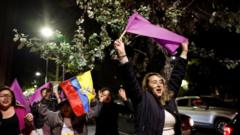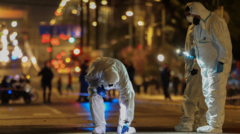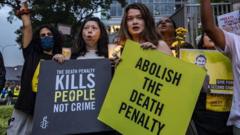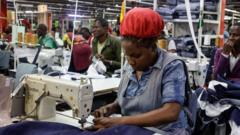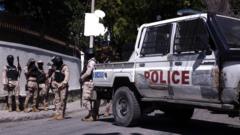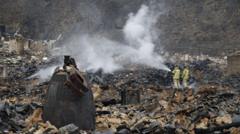In a striking incident at Kenya's national high-school drama competition, police clashed with students and onlookers after a controversial play ignited public outrage over youth activism and governance.
Tear Gas and Tensions: How a School Play Erupted in Controversy in Kenya
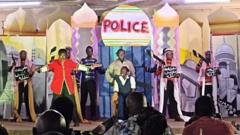
Tear Gas and Tensions: How a School Play Erupted in Controversy in Kenya
A dramatic school performance in Kenya turned chaotic as police intervened with tear gas amidst rising tensions.
The performances at the competition were interrupted when police deployed tear gas to disperse a crowd eager to see "Echoes of War”, a thought-provoking play written by Cleophas Malala, a former senator. The production portrays the power of digital spaces in governance and youth activism, shining a light on ongoing political discontent in Kenya.
Initially disqualified under vague circumstances, the play's inclusion followed a High Court ruling that supported its rightful place in the festival. Tensions escalated when students protested outside the venue after Malala, blocked by police from final rehearsals, was arrested and later released without charges.
Proud of their demonstration against perceived police intimidation, the Butere Girls authored an emotional exit from the venue, singing the national anthem and declaring that there was "no audience" for their performance. Education Minister Julius Ogamba criticized Malala’s involvement, describing him as unqualified for the role of a play director.
The incident has sparked strong reactions, with Amnesty International condemning the police's actions as part of a troubling trend of suppressed free expression. Opposition leaders have expressed solidarity with the students, who symbolize a generational divide and a growing demand for societal change as Kenya grapples with issues of governance, youth rights, and press freedom.
This controversy illustrates the ongoing friction between the younger generation, seeking innovation and reform through technology, and the established political figures in Kenya.
Initially disqualified under vague circumstances, the play's inclusion followed a High Court ruling that supported its rightful place in the festival. Tensions escalated when students protested outside the venue after Malala, blocked by police from final rehearsals, was arrested and later released without charges.
Proud of their demonstration against perceived police intimidation, the Butere Girls authored an emotional exit from the venue, singing the national anthem and declaring that there was "no audience" for their performance. Education Minister Julius Ogamba criticized Malala’s involvement, describing him as unqualified for the role of a play director.
The incident has sparked strong reactions, with Amnesty International condemning the police's actions as part of a troubling trend of suppressed free expression. Opposition leaders have expressed solidarity with the students, who symbolize a generational divide and a growing demand for societal change as Kenya grapples with issues of governance, youth rights, and press freedom.
This controversy illustrates the ongoing friction between the younger generation, seeking innovation and reform through technology, and the established political figures in Kenya.







